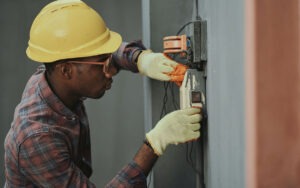
September 29, 2020; Model D
It’s not easy to be Michigan Governor Gretchen Whitmer (D). Just yesterday, it was reported that the FBI had thwarted a kidnapping attempt against her by white supremacists. This story, however, looks at a longer-term policy challenge facing the governor—namely keeping Michiganders in their homes. Like many governors, Whitmer this spring issued executive orders to place a moratorium on evictions to keep people in their homes, even as hundreds of thousands in the state—or even millions— lost jobs or had their hours significantly reduced. Despite keeping families off the streets, the moratorium did nothing to preserve rent revenue, creating a looming crisis. Among those affected were housing nonprofits in Detroit.
On September 1, 2020, the Trump Administration, in conjunction with the Centers for Disease Control (CDC), enacted a nationwide moratorium on evictions until January 1, 2021. But the ban doesn’t offer housing nonprofits or landlords any means to recoup their losses either; as Diane Yentel, CEO of the National Low Income Housing Coalition in Washington, DC, observes, “While an eviction moratorium is an essential step, it is a half-measure that extends a financial cliff for renters to fall off of when the moratorium expires and back rent is owed.”
This financial cliff is national, of course, but Detroit offers an important microcosm of the effects of unpaid rent, which, absent policy intervention, will continue to mount in the coming months, especially with the expiration of the CARES Act unemployment benefits, which expired at the end of July 31, and the failure of the Trump administration and Congress to pass further coronavirus relief.
According to Tim Thorland, executive director of Southwest Housing Solutions (SWHS), a nonprofit specializing in implementing and managing affordable housing and commercial properties in Detroit, rent losses have been significant, but the CARES Act unemployment benefits softened that blow somewhat. “We lost approximately $150,000 in rent through that first period (from April to July),” Thorland notes. “In comparison, our August delinquency right now is at $83,000. It’s a big jump.”
Many other organizations that provide affordable housing in Detroit, such as the Detroit Catholic Pastoral Alliance (DCPA), a thirty-year-old, faith-based nonprofit that manages four low-income housing developments in Detroit, are in similar circumstances. DCPA offers financially strapped renters a “second chance,” providing a more flexible approval process than property management companies typically do. Executive director John Thorne, like so many in Detroit, is concerned about the numerous evictions that will inevitably occur once the moratorium is lifted in January. DCPA has a project-based voucher program that has enabled renters to stay more current on payments, but the nonprofit foresees losing about $11,000 in 2020, which Thorne calls “a huge impact on the budget.” Ted Phillips, executive director at the housing advocacy nonprofit United Community Housing Coalition (UCHC), also has concerns about what comes next for Detroit tenants. Phillips’s organization identified 2,600 judgments and around 550 orders of eviction between February 3rd and March 13th of this year.
Detroit could be looking at an eviction tsunami once the moratorium is lifted. Eviction is a continual threat in Detroit because the city has far more renters than homeowners. At the end of August, 38.6 percent of people in the Detroit metro area faced eviction or foreclosure within the next two months, as reported by the Census Bureau’s Household Pulse survey. Nationally, despite the month of September showing some improvements in rent payments, Apartment List found “one-in-three renters started September with outstanding back rent owed, nearly unchanged from August.”
Among those with unpaid rent bills, close to half owe their landlords less than $1,000, while just five percent of all renters owe more than $2,000. These results indicate that another round of stimulus payments of a scale similar to those that went out earlier this year could help a significant share of renters catch up on their rent…
Sign up for our free newsletters
Subscribe to NPQ's newsletters to have our top stories delivered directly to your inbox.
By signing up, you agree to our privacy policy and terms of use, and to receive messages from NPQ and our partners.
Segmenting our survey data by race illuminates significant variation in the prevalence of unpaid housing bills. The share of white renters with unpaid rent is well below the overall rate at 24 percent. Meanwhile, Black and [Latinx] renters are far more likely to owe unpaid rent, with rates of 48 percent and 41 percent, respectively.
Studies have shown how housing instability and eviction vulnerability have historically had a much greater impact on communities of color, and 79 percent of Detroit’s residents are Black, making Detroit home to one of the largest Black communities in the US. As reported by Vox, Detroit’s long history “of redlining and discriminatory policies locked Detroit’s growing black population into poverty over the past century.”
As desegregation movements ramped up in the ’50s and ’60s, the once-predominantly white city of Detroit saw a shift in demographics with suburbanization and “white flight.” However, that did not ease redlining practices (black people are still more likely than whites to be denied a loan today) and Detroit has remained one of the most segregated cities in the country…today, nearly 37 percent of the population lives in poverty, according to 2019 Census data.
Beginning next week on October 12th, the Michigan State Housing Authority will begin accepting applications for the Eviction Diversion Program (EDP). The EDP was created in the summer to keep Michigan renters in their homes through “a special court process to get fast rental assistance for renters who have been impacted,” whereby $50 million is available to landlords “in exchange for allowing tenants to remain in their homes, forgiving late fees and up to 10 percent of amount due.”
DCPA plans to apply for EDP funds to help offset its rental losses, but Phillips claims the EDP’s provisions are unlikely to “cover all of the rent owed across the state.”
“They’re definitely going to fall short,” Phillips says. “It’s a lot of money, but there’s a lot of need.”
Are there better solutions for the many families in Detroit and across the US who are facing housing insecurity in the midst of a pandemic and economic crisis with no obvious end point in sight? Despite the funds allotted through the EDP, the eviction moratorium seems to be merely forestalling in Detroit the looming housing crisis NPQ reported on earlier this year, shifting it to the early months of 2021 instead of the end of 2020. Boston University created a housing justice wish list that starts with the recognition of housing as an inalienable human right for all Americans and further includes the “widespread availability of public and social housing, effective rent control, the abolition of homelessness, and a comprehensive tenants’ bill of rights in all housing policy and legislation.” Housing advocacy nonprofits in California have also been actively seeking systemic solutions that go beyond the stopgap solutions currently being applied by the government, advocating for affordable housing to be considered akin to infrastructure, like a freeway or a bridge, in addition to changing the way we use our land, such as the recently defeated SB 1120, which would have rewritten single-family zoning laws to allow single family homes to be turned into duplexes and thereby house more people.
We are in unprecedented waters as a country, with millions suffering and tens of thousands dying. Widespread evictions will only compound in unforeseen ways the current suffering in cities like Detroit. Despite the incredibly meaningful and necessary work housing advocates and nonprofits are doing, their abilities are limited without significant government assistance to keep tenants and landlords alike from falling off the financial cliff and until bills like SB 1120 pass and the Boston University wish list becomes our reality.—Beth Couch













